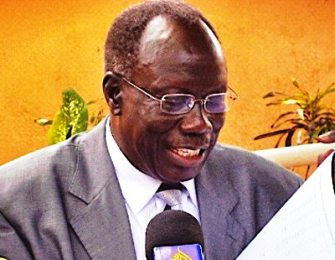SPLM-IO Equatorian caucus calls for suspension of deputy chairman Alfred Lado Gore
June 21, 2015 (NAIROBI) – Senior leaders from South Sudan’s greater Equatoria region in the armed opposition faction of the Sudan People’s Liberation Movement (SPLM-IO) led by former vice president, Riek Machar, have called for suspension and investigation of General Alfred Ladu Gore, deputy chairman of the movement, for allegedly being bribed and planning to rejoin president Salva Kiir’s government.
In a public statement signed on 20 June by a 27-member of the Equatorian caucus of the SPLM-IO, it charged the rebel’s deputy chairman, Alfred Ladu Gore and other two rebel officials including Ramadan Hassan Laku, who is chief coordinator in the office of the chairman and Adel Sandrai, representative of the movement in Kenya, for conducting secret meetings with government agents who planned to divide the movement and subsequently bring back the defected officials to Juba.

The statement which urged the chairman and commander-in-chief of SPLM/SPLA, Riek Machar, to suspend the three officials was signed by 27 Equatorian officials of the caucus in the rebel faction, including Oyet Nathaniel Pierino, chairman of national committee for political mobilization and orientation; Richard K. Mulla, chairman for national committees for justice and human rights; Odwar Henry Dilang, chairman for SPLM/SPLA engagement committee; Aggrey Iddri Esbon, deputy chairman of national committee for resource mobilization; Mannaseh Zindo, deputy chairman of national committee for women and youth empowerment; Marko Lokidor, Lochapio, governor of Kapoeta state; Otim David, SPLM/SPLA representative to Nigeria and ECOWAS, among others.
“Urge the leadership to suspend from office Cde. Alfred Ladu Gore, Cde. Ramadan Hassan Laku and Cde. Adel Senderi,” declared the Equatorian leaders in the statement Sudan Tribune has obtained.
“That the leadership establishes a five (05) member independent investigation committee headed by the Deputy Chairman of the National Committee for Justice and Human Rights to investigate and render reports with recommendations within two weeks on the misconducts of Cde. Alfred Ladu Gore, Cde. Ramadan Hassan Laku and Cde. Adel Senderi,” partly reads the statement.
They accused the trio of abandoning the official dialogue sanctioned by the leadership between three pro-government Equatorian governors, Clement Wani Konga, Louis Lobong and Joseph Bakosoro, of Central, Eastern and Western Equatoria states, respectively, and 9-member committee appointed by the chairman led by Odwar Henry Dilang with the aim to harmonize Equatoria’s position in the peace process, mainly on the question of federalism and reforms.
The statement alleged that the three Equatorian rebel leaders instead came up with their own position paper which resorted to “dubious” deals that involved monetary bribery and activities to dismantle the rebel movement.
“Condemn the misconducts of Cde. Alfred Ladu Gore, Cde. Ramadan Hassan Laku and Cde. Adel Senderi for lack of transparency and secrecy in dealing with the three Equatoria Governors and the fact that the trio deliberately isolated, ignored and eventually undermined the functions of the official nine member SPLM/SPLA Engagement Committee,” the statement further reads.
The caucus further accused the officials of harbouring and pursuing dubious interests aimed at dividing the ranks and files of SPLM/SPLA into regional, sectional and tribal groupings and subsequently defecting from the movement.
“Accepting and receiving funds from the Government of South Sudan through their agents to facilitate parallel activities within the SPLM/SPLA and defections of Equatorians who are members of SPLM/SPLA,” further charged the statement.
It accused them of “holding secret meetings with agents and governments of countries hostile to the interest of the people of South Sudan and SPLM/SPLA.”
They cited that Gore and the other two officials undertook illegal secret mission to Uganda on 25 May, 2015, in order to meet representatives of the government of Uganda and the Equatoria governors in Kampala with the intention of consolidating plans parallel and harmful to the interests of SPLM/SPLA and stability of South Sudan.
They also charged them for using “seditious, derogatory and divisive languages” on fellow members of the movement, adding that the Equatorians caucus in the rebel movement in their four-day meeting this week resolved to suspend and ex-communicate the three officials from the membership of Equatoria in SPLM/SPLA Caucus and “cease all official interactions and business with Cde. Alfred Ladu Gore, Cde. Ramadan Hassan Laku and Cde. Adel Senderi in their respective capacities.”
The statement proposed that the report and recommendations by independent investigation committee be tabled in the next SPLM/SPLA Leadership Council Meeting for discussion. They also resolved to halt with immediate effect any engagement with Equatoria states governors and their “agents” until investigations are carried out.
“Urge the leadership of the SPLM/SPLA and members of SPLM/SPLA to deal with impunity and remain seized of the matter,” it says.
They also appreciated what they said were the various appointments of sons and daughters from the Equatoria region into positions of responsibilities in the rebel movement and urged the leadership to expeditiously make appointments of states governors in the remaining newly created five states of greater Equatoria.
There have been speculations that president Museveni was looking forward to creating another rebellion for greater Equatoria region which he can control and use as a centre of influence to mediate with president Kiir’s government on his own terms as the IGAD peace process seemed to have sidelined him in the process.
(ST)
